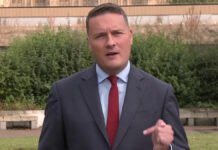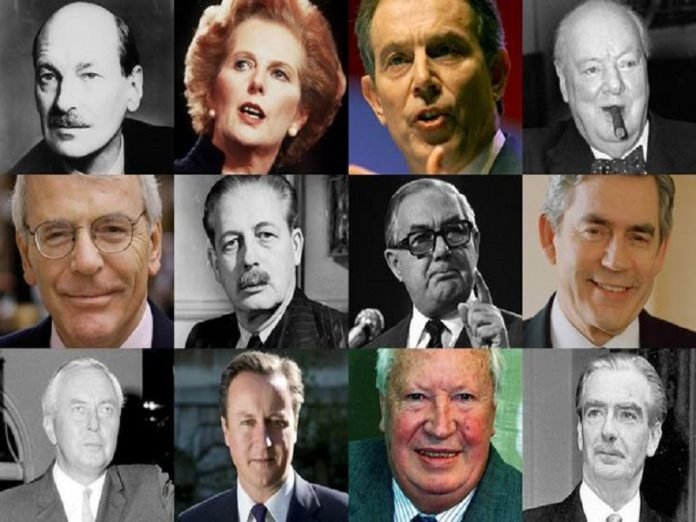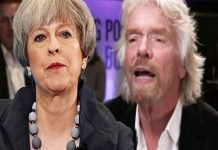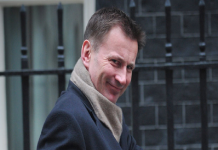“In the next few minutes of your time I shall attempt to outline the importance of voting, give a brief history of British politics, and finally conclude with my own personal view. For if there was ever a time in need to vote, that time is most definitely now. For now we vote for our NHS, our disabled and disadvantaged, our human rights, our homeless people, our education and our future generations. In effect, it’s the “Do or Die” type scenario. So grab a cuppa, the biscuit tin and enjoy your read.
Since post-war Britain in the 1940’s, the number of voters has dropped drastically from around 84% in 1950, gradually stumbling down to 66% in 2015. Also, the population difference in those years has drastically changed, with an average population of 50 million in 1950 and 65 million in 2015. With only 42 million people voting, that’s a huge 23 million people who choose to say nothing for their country at the time it’s needed the most. So how do we bring back the voters, and ensure British democracy stands for all? The simple answer is to vote – but getting people to vote can be difficult. Whenever I’m in a political conversation with anyone, I find it rare that people know anything of British political history, apart from certain names and events that have stood through time like Churchill and WW2, Thatcher and the miner strikes, or most recently Tony Blair with the Iraq War. And even then no true ‘common person’ understands the full picture, because we’re not exactly educated with this in school are we. So maybe the lack of voting in recent election’s is not so much because ‘all politicians are the same and therefore nothing will change’, but because nobody knows what has changed due to voting in the past. I believe that understanding our past is the key to creating our future. By understanding the past you can pick out all the good bits from successful and even failed plans of politics to create a new and fresh version of combined ‘best-bits’ with added new ideas. So allow me to take you into our country’s political past and see what has led to this significant moment in time.
Let’s start with the end of world war 2. After the fall of Nazi Germany in May 1945 it was agreed that the coalition government would stay together until Japan’s defeat. This was however opposed by Herbert Morrison of Labour and so Churchill was forced to make his resignation as Prime Minister and call a general election, in which many were surprised when Attlee’s Labour had won by a landslide, as it was Churchill who was hailed the ‘war hero’ many expected him to win and remain in office. During Clement Attlee’s period the Labour government achieved full employment due to an extensive building programme set to rebuild Britain’s houses and industries destroyed during the war, which was no easy feet as the country was almost completely bankrupted and by 1947 the sterling was in crisis over convertibility, making the pound devalued by ’49. To save money and help the economy grow quicker Attlee nationalised much of the transport systems and industries making everything cheaper and easier for the public, meaning the public were spending more into the economy itself. He also kept war-time rationing too, but that enabled him to make less cuts to the public sector. With the help of the ‘Minister of Health’ Aneurin Bevan, Labour created the NHS (National Health Service), which paid for through National Insurance (NI) was a free health service to anyone in Britain and also increased the welfare state. But with the UK being apart of the newly founded United Nations (UN) and the Cold-War looming, Attlee was obligated to take Britain to war in Korea in 1950 and was unable to see it through when in 1951 he lost the general election to Winston Churchill.
During Churchill’s second term in office the Mines and Quarries Act of 1954 and the Housing and Repairs Act of 1955 were introduced to deal with employment of younger people and women into mines and quarries and to define any houses not safe enough to live in. The building of Attlee’s council houses was sped up, building more than 300,000 houses per year and tax allowances were raised, as to were pensions and national assistance benefits. He also put charges down on NHS prescription medicines going against the original idea of the NHS being free. Kenya and Malaya wanted independence from the British Empire and opened in rebellion to British rule. Churchill opposed this by sending the military to crush the rebellions. Although successful, it was clear that colonial rule of these countries was no longer manageable. Britain’s Empire was also being tested in the Middle-East with the Arab-Jewish crisis in Palestine and the dispute between Britain and Egypt over Britain’s ownership of the Suez Canal and Sudan. With the country steadily plodding along, Churchill spent most of his second term trying to keep British Imperialism in place around the world and Britain as one of the three main world powers. Churchill having been ill a few times during this term kept putting off his resignation wanting to meet with the Soviets. His cabinet disagreed to any meeting and eventually in 1955, Churchill resigned. Not long after, the soviets called a conference themselves to discuss the matters of the cold-war, known as the Geneva Summit.
In Conservative Anthony Eden’s time as Prime Minister not much changed for Britain. He was a popular, charming and handsome figure and called an election in which he increased his majority from 17 to 60. He is best known for calculating and conducted a war between Israel and Egypt in an attempt to remove Nasser from power in Egypt in order to take back control over the Suez Canal, which Nasser had nationalised against the wishes of Britain and France as this was Britain and France’s main oil supply route. Whilst taking two holidays during his small term his party shifted there loyalty from Eden to Harold Macmillan and was succeeded by him after he resigned from office in ’57.
Conservative Harold Macmillan proclaimed his priority to the economy and to increase employment as high as possible especially with an election looming. His one-nation approach to the economy was not backed by the Treasury who suggested spending cuts and a rise in unemployment to help the suffering sterling. Macmillan rejecting this led to three Treasury ministers resigning. Many social reforms were introduced such as the 1956 Clean Air Act, 1957 Housing Act, 1960 Offices Act, 1960 Noise Abatement Act, and the Factories Act of 1961. He also introduced a pensioners scheme, the Child’s Special Allowance and enacted a reduction in working hours per week from 48 to 42 hours. In 1959, he won the general election and increased his majority from 67 to 107. Many believe the Conservatives kept winning because of industrial labour working pay had risen by 20% since Churchill took office in 1951. By 1961, Britain was having balance of payment issues and wages froze as a result and as a result of that, the Conservatives lost popularity amongst the people and lost some by-elections too. The party became increasingly fragile and Harold Macmillan in fear of some members around him had a cabinet reshuffle in 1962. This was known as the “Night of the Long Knives” when many Conservative ministers were sacked. In 1963 came the Beeching Axe where by British railway networks were completely changed around to as Harold put it “the railway system must be modelled to meet current needs” where by many towns and villages lost there train stations and tracks (2,363 stations and 5,000 miles of track to be precise). Also during Macmillan’s time we saw Britain’s de-colonising of Africa, giving independence to places like Nigeria, Kenya, Uganda and many others. Macmillan helped create the European Free Trade Association (EFTA) with European country’s outside of the European Economic Community (EEC). By 1960 he had established a free trade area and in 1963 attempted to get Britain into the EEC but France Vetoed it because of the special relationship between Britain and America (fear of the Americans getting involved in European affairs). After the Vassall affair and Profumo scandal the Conservative party had turned against Macmillan and was pushing him to resign. After a successful prostate cancer operation (knowing it was benign anyway) used this as his way out. He wanted Rab Butler to succeed him but instead it was Alec Douglas-Home in 1963 who would become Britain’s next Prime Minister.
During this tiddly period of politics two things of some significance happened. One, the Resale Prices Bill was introduced so that the retailer could sell manufacturers and suppliers products at the prices they wanted too. This was seen as bad as it gave supermarkets and other big shops more of a competitive advantage over smaller shops. And two, Alec Douglas-Home narrowly lost the 1964 general election to Labour’s Harold Wilson.
Harold Wilson’s main aims was to manage the economy through planning, prices and incomes policies to achieve growth and full employment and enhance equality and social justice through extending on welfare, health, housing and other public services. These plans were faulted by an economic crisis in 1966 and led to increased unemployment and little economic output. Further devaluation of the pound in ’67 led to more deflation policies, wage restraint and the need to negotiate credits from the International Monetary Fund (IMF). After an ill-judged television broadcast Wilson downplayed the economic crisis and gave no confidence to him or his Government from the people of economic competence. Wilson went on to undermine his own authority further by proposing A White Paper, In Place of Strife, which sort to use law to reduce trade union power (trade unions being what essentially made Labour) but was never passed. Labour did in fact introduce a few reforms in higher education such as introducing the Open University, arts funding and in liberalizing measures from the Home Office. All this in mind during Wilson’s Labour term unemployment increased, economic growth was slower than when they went in, and it’s said ‘Labour were unable to live up to there goals’. So it was in the 1970 general election the Conservatives were back, led by Edward Heath.
Under Edward Heath there were failed attempts of free-market reforms which led to increased levels of unemployment and inflation. Public sector pay was restricted as to were the powers of the trade unions, resulting in disputes with main groups such as the miners and others within power supply, leading to industrial unrest & power cuts. Eventually forced into reversing his free market reforms and introducing incomes policy to stabilize the economy, Heath called an election on the theme, “Who Governs”. Also higher charges were introduced for school meals, spectacles, dentistry, and prescriptions. And with Thatcher as ‘Secretary of state’ for education and science at this time with cuts to education funding, took away free milk to children between the ages of 8 – 11, being dubbed “Thatcher the milk snatcher”, but also blocked the abolition of the Open University created by the previous Labour Government. The Conservative Government supported the building of nursery school’s, introduced new benefits to support the disabled not caused by war or by industrial injury and for those needing care at home. Under this Government the UK was finally accepted into the EEC, which would later become the EU.
In 1974 Labour wins under Harold Wilson on the most radical manifesto in history. For example Chancellor Healey introduced increased pensions and benefits. But Labour were faced with problems. With only a majority of four Labour was restricted on there legislations. Majority declined during there time in office and by the end of term, they were looking for support from the Liberals and others. The Government was making no progress on anything and was lacking clarity and by 1976, Wilson had resigned. James Callaghan succeeded him and yet again the Labour Government were beset by financial difficulties and pressure on the pound, deemed to be because of high levels of public spending and borrowing. This was followed by lots of spending cuts and wage restraints. Eventually the Government was again forced to negotiate an IMF loan in 1976. Due to the loan more cuts of £2bn were made, although Callaghan was able to reduce the cuts and was able to lift confidence in the economy with a speech at the 1976 Labour Party conference. The main reason Callaghan was led to the IMF loan was because the Treasury overstated UK borrowing by £4bn, also the financial markets and US governments determination for the UK to follow it’s economic orthodoxy. While the unions did support the government throughout all these difficulties, by 1978 they were against any further wage restraints. With industrial unrest and public service strikes the ‘Winter of Discontent’ as it was called of 1978-’79 took hold and Labour were concluded as being ‘unable to do it’s best’ in extremely difficult circumstances and was beaten by the Conservatives in 1979. And in came Thatcher.
Margaret Thatcher’s Conservative Government of the 80’s has proved to be the most controversial of them all. Her government led to the privatization of state ownership, lower taxes, higher taxes, new taxes, reforms to government, the economy and the labour markets. During this period unemployment was at an all time high with miners being put out of work and trade unions almost completely being destroyed. She gave working-class people the right to buy there council houses and to purchase shares within the company they worked for, which through money gave people more ownership. The rise in unemployment and social unrest laid waste to industrial production in the UK. The miners strike of 1984-85 led by Arthur Scargill were condemned as being illegal and ended with around 80% of the coal industry being closed down with no new jobs for the now mass unemployed poor. Thatcher also took us further into Europe by signing the single European act of 1986 and introduced the widely unpopular ‘poll-tax’ which replaced domestic rates and increased taxes to individual people. Personality and policy clashes within the Conservative party in the later periods of Thatchers Government led to the resignation of chancellor, Nigel Lawson, and foreign secretary, Geoffrey Howe in 1989 – 90, and her own resignation shortly afterwards.
John Major entered No.10 in 1990. Nothing much really happened in 1991 apart from increased numbers of unemployed and a deepening recession. In February of 1992 Major signed into the Maastricht Treaty (with much scepticism) and took Britain again further into Europe. He also won the general election with the highest number of votes for a party in British political history, but with a much reduced majority of 21 seats in the commons. Less than a year after election victory, public opinion of Major plummeted with Black Wednesday (caused by the devaluing pound), mine closures, the Maastricht dispute and high unemployment. To help the pound he introduced a new policy of flexible exchange rates, which saw a rise in British exports. Euroscepticism within the Conservative party led to a vote of no confidence and even though Major won, he lost much of his backing from the party. For much of Major’s later part at being PM the main focused debate was whether or not to join the European single currency, and by 1997 many of the Conservatives were against it. Between 1994 and ’97 Major re-privatised British rail dividing it among the private sector and taking it out of public ownership. A highly controversial move that led to increased prices on tickets during a time of increasing passenger numbers. The Conservative party during Major’s time were also supposedly taking part in many scandals which were always the centre of media attention such as, David Mellor’s extramarital affair, Lord Caithness and his adultery (which led him to commit suicide), and Stephen Mulligan found dead after autoerotic asphyxiation (a sex act). Other notorious scandals are Alan Clark supplying Iraq with weapons during the Iran-Iraq war of the 80’s, Conservative members accepting bribes from mainly newspaper companies to ask certain question in the House of Commons and Defence Minister Jonathan Aitken’s secret deals with Saudi prince’s. Major wrote in 1999 he was angered at the way in which a host of scandals, many of them petty sexual misdemeanours by a small number of MPs, were exploited by the press and Opposition for political advantage. After a second leadership election victory in 1995 Major had lost popularity with the public. The economy was slowly on the rise and the pound was relatively stable again, but during his time in office nothing had truly changed. And so with the public feeling no better off after a 18 year Conservative Government they were voted out in the hope for a prosperous change in economy, the pound and socialism.
Tony Blair and “New Labour”. With past Labour government downfalls of the past in mind, Blair continued with the Conservative levels of public spending for the first two years of office in an attempt to change the ‘boom and bust’ style economy that had gone before. They also set themselves an ambiguous task of abolishing child poverty within 20 years, which as we see in modern times was not accomplished. But they were able to implement much of there reforms such as, devolution of Scotland, Wales, Northern Ireland and London. They invested much into the NHS, introduced a national minimum wage and created the New Deal and Sure Start programmes aimed at dealing with unemployment and supporting disadvantaged children. 2001-onwards saw the Labour government being dominated by terrorism and impinged on civil liberties due to freedom of speech surrounding the infamous Iraq war. With the resignation of Blair after the Iraq war in 2007, Chancellor Gordon Brown now became Prime Minister and was faced with the choice of calling or not calling a snap election, He decided not to call one even with the polls in his favour. This proved to be a bad choice after all with David Cameron’s Conservative party winning popularity and a few by elections. Brown’s Manifesto for change outlined a plan to test Britain for the new age of living. He started with a rule book for ministers to follow to outline how they should behave, he called it the Ministerial Code. He then planned to have an all-party convention to seek new powers for parliament, rebalance the powers of Whitehall with local government and to give the power of sending troops to war to parliament. He proposed the idea of shared equality schemes, echo-towns housing 10-20,000 home owners and even proposed having doctors surgeries open at weekends. Brown followed up Blair’s commitment to the Irag war and made speeches about how “war is terrible” yet was later accused by senior officials within the military that Brown wasn’t adhering to the Military Covenant (lack of equipment, etc.). The biggest part of Brown’s career was the banking system collapsing and many common people loosing extreme amounts of money that they had saved for most, almost all there lives, So Brown used public spending money (a sum of £500 billion) to hold-up the system and stimulate the economy. Even today that is seen as a bad choice for now it seems the failures of the bankers has meant the public loose out twice while the banks still go on as normal. The economic crisis that followed gave way to the collapse of politics and faith in the system. In the end we were left with none of what Brown hoped to achieve from his Manifesto and a growing deficit.
In May 2010 after Gordon Brown’s Labour are accused of many things like the growing deficit, the immigration crisis and allegedly letting 80,000 criminals walk free from prisons looses the general election to David Cameron’s Conservative party. But with not enough of a majority to form a government, the Conservatives paired up with the Liberal Democrats and made Nick Clegg (leader of the Lib Dem’s) deputy Prime Minister. In one of Cameron’s first speeches as PM he said that the problems that Labour had created were worse than expected, that many tough decisions and cuts would be made. And by 2015 claimed that the Tories had reduced the deficit by half but with no real evidence to back it up. During Cameron’s campaign he pledged to reduce yearly levels of immigration from 210,000 to less than 100,000 but in fact increased it by roughly 80,000. He joined NATO in the bombing of Libya in the overthrow of Gaddafi which took the country from being wealthy to economically and socially destroyed and wanted to also take military action against Assad in Syria but Cameron was the first PM since 1782 to loose a foreign policy vote in the House of Commons and was unable to attack. A few other foreign policy’s were enacted by Cameron such as the Falklands referendum in 2013 which out of the 92% of the population that voted only 3 of them voted to leave, the close relationship with Saudi Arabia being surrounded by secret deals and Cameron supporting Turkey’s bid to join the EU but during our own referendum claiming that they wouldn’t be ready to join the EU until the year 3000 due to there financial and immigration issues. In 2015, Cameron led the Conservative party to as the polls thought an ‘unexpected victory’ and had a big enough majority to form a government. After the Paris attacks he was able to gain enough support in the House of Commons to launch air-strikes against supposed ISIS within Syria. He stated in his manifesto that he would hold a referendum for Britain’s EU membership and would campaign to remain and after a 52% to 48% to leave, David Cameron resigned as PM shortly after saying, “I do not think it would be right for me to try to be the captain that steers our country to its next destination”.
After a Conservative leadership election in 2016 Theresa May was to become the new party leader and supported the idea of the party coming together on the differences of the referendum outcome to stand by the decision of the country to leave stating that Brexit means Brexit and there will be no second referendum even though she supported to remain. May, after many had called upon her to call an early election she decided not to do so as Brexit was more important to her even though back in 2007 she criticised Gordon Brown for not calling an early election. Her first cabinet meeting was described as one of the biggest re-shuffles in decades and saw many of Cameron’s ministers either sacked or resigned and replacing them with members of the EU leave campaign such as Boris Johnson as the Foreign Sectary, David Davis as Brexit Sectary and Liam Fox as International Trade Sectary. May stalled the final approval for the Hinkley Point C nuclear power station after protests about the Conservatives selling off Britain’s industries but initially accepted the deal after the fuss had died down.
Cameron during his term supported Saudi-Arabia’s intervention in Yemen and Theresa May has done the same even though critics claiming that weapons supplied by Britain are apart of war crimes committed by Saudi-Arabian’s in Yemen. During the House of Commons debate on Trident May was asked whether she would be prepared to authorise the killing of hundreds of thousands of innocent people in a nuclear strike , her reply was a blunt yes claiming our enemies need to know that we are prepare to push the button. She also denied any knowledge of Trident malfunctions that happened in 2016. May has stated from the start that with Brexit she would like to see more trade between the Unites States and the United Kingdom. May was also heavily criticized for not opposing Trump’s Travel Ban (Executive Order 13769) and for also inviting Trump into Britain to meet the Queen. After much criticism and to try and gain a higher majority Theresa May has finally called a snap election.
So, after that long and bumpy ride through our political past, I think it’s fair to conclude that all our PM’s no matter the party has had there good points and bad points (some more extreme than others). On the one hand we have Labour always trying to boost public spending (sometimes being there downfall) and aiming for a more socialist country but usually being hit hard with financial crisis and on the other, the Conservatives who believe solely in the national interest but always have high unemployment in any of it’s Conservative governments. No matter who you decide to vote just as long as you vote. Whether you are a loyal supporter for one of the main parties or think that it’s time for a new change and you vote for a smaller, lesser known party your vote is the only time you truly get a say in how your country is run and how your life is led. Just imagine what sort of a country we’d live in if all 65million people here voted to have there say. Don’t let the media scare you with contradicting news or even bother with the parties dirty remarks to each other, because as Thatcher once put it “if they attack one personally, it means they have not a single political argument left”.
Of course I urge people to research into politics further for this is only a brief history into how our country has been run for the past 72 years. The twists, the turns and the unexpected outcomes. Good decisions, bad decisions and even decisions that should have never have had to made. I hope this has been an insight for you and hope it helps with your next election decision.”
This is a "Pay as You Feel" website Please help keep us Ad Free.
You can have access to all of our online work for free. However if you want to support what we do, you could make a small donation to help us keep writing. The choice is entirely yours.






















